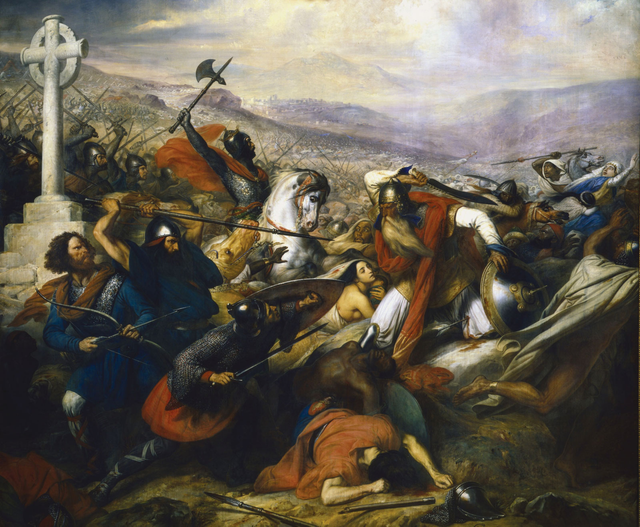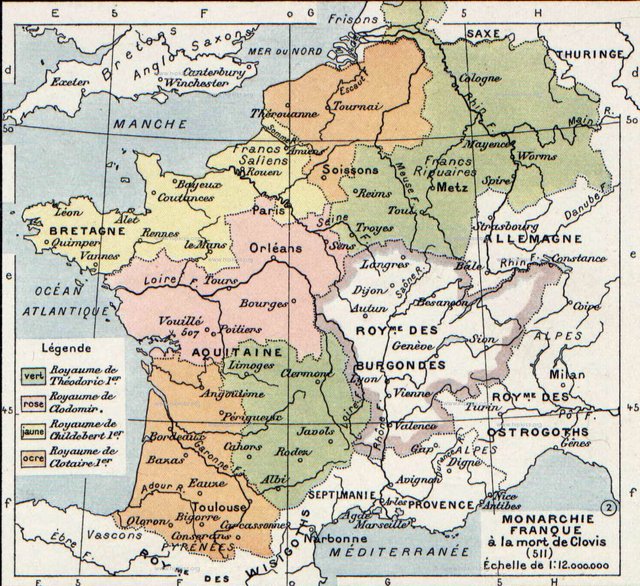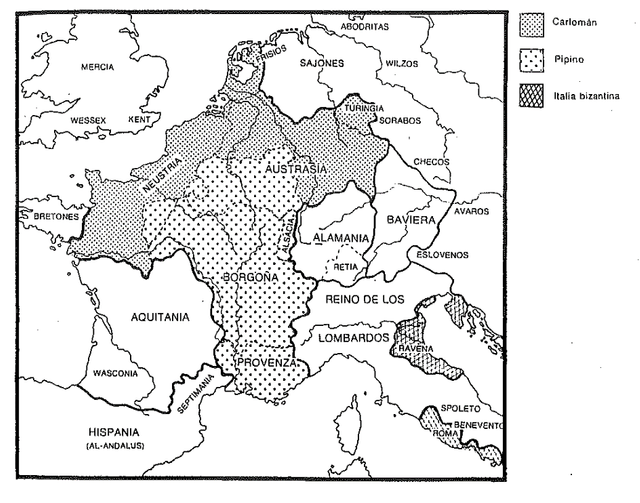The more distracted individual, when it hears Carolingian empire, can think its origin traces back to Charles The Great, also known as Charlemagne, but that is incorrect.
In the course of this series, you will discover the political history behind one of the greatest empires Europe has ever seen.

Charles Martel in the decisive battle of Tours (732 C.E). By Charles de Steuben (1834–1837).
Founded in 486 C.E by Chlodwig, the Salian Frankish kingdom had risen to a dominant position in the geopolitical scene of the Early Middle Ages Europe, much as of a result of its acquired territories from a rotten Roman empire. Thought to have come from the regions of the Rhine, Chlodwig succeeded in a series of military campaigns, first against the Romans in Gaul and then against the other "Barbarian" tribes trying to gobble up previous Roman territory, like it was the case with the Visigoths, established in Toulouse, that Chlodwig drove out of southern Gaul, gaining hegemony and solidifying is kingdom.
As Chlodwig consolidated its victories, he established his kingdom's capital in Paris and founded a Dynasty which would be called the Merovingian Dynasty. However, this would not last. Salian Frankish tradition had it that, upon one's death, all his possessions should be divided by his sons and Chlodwig, a upholder of Salian Frankish tradition, would not have it any other way, and so, upon his death in 511, his kingdom was divided among his four sons, creating four new and independent kingdoms in the previous unified Gaul. 
Division of the Frankish Kingdom upon Chlodwig I's death in 511. In green the domains of his son Theuderic I; In yellow of Childebert I; In pink of Chlodomer; and in orange of Clotaire I. Their capitals respectively in Soissons, Paris, Orleans and Reims. By Vidal-Lablache, Atlas général d'histoire et de géographie (1894)
This partition was and would be many times in the future, the source of numerous conflicts between heirs, as one wanted ultimate supremacy over the other, and which, in return, would deeply erode royal power.
The Frankish sub-kingdoms that the constant divisions produced were very unstable and variable, but certain areas began to differentiate from each other, those being: Aquitaine, Neustria, Austrasia, and Burgundy.
Eventually, one Merovingian would unify all the Frankish lands again, as did Clotaire II in 613, but the constant infighting that the sub-kingdoms already had left a crippling effect on the power of the Merovingians. You see, as each descendent of Chlodwig (Or Clovis) fought over French hegemony they would give substantial concessions to the aristocracy for them to help. This concessions eventually degraded the power of the Merovingian Kings to the point that the established Mayors of the Palace were stronger than the King, eventually becoming Kings themselves.
From the seventh century onward a famous dynasty ascended to the position of Mayor of the Palace, those being the Carolingians. Originated from Austrasia the Carolingians had a serious advantage as they had full support from the Austrasian nobles. These individuals profited massively by the ascension of the Carolingians to the position of Mayor of the Palace, as they expanded not only their territories but also their spheres of interest. Even though the Carolingians had mustered strong support from their nobles, the members of the family fought one another for power.
Likewise, Charlemagne's grandfather, Charles Martel fought his family members and was ultimately able to claim the Mayor role solemnly for himself. What he then used to aggressively expand his authority in Aquitaine and Provence. At this moment the Merovingian king, Theuderic IV, as only a figurehead, having no real power or say in the Frankish dominions. Charles's position was not only fortified by Pope Gregory III's decision to endowed him with the title subregulus as and indication of his position as the de facto Frankish ruler, but also by driving out the encroaching Arab menace in the south of his domains with the most "decisive" battle being the one in Tours in 732. I say "decisive" because the importance of the battle was deliberately extrapolated to legitimize Charles's authority, as, for one, he had fought many times before Tours, and this victory was like many others and, secondly, the Gaulic regions lay too far away for the Arab regime who had conquered most of Iberia and established its capital in Cordoba.
Charles Martel, as an autocratic as he was, committed the same mistake as the Merovingians had when they all had continued the practice of dividing the kingdom upon death, partitioning the Frankish domains by the three sons of his: Pepin, Carloman, and Gryfo. The last ended up imprisoned and out of the political power game, the second was obliged to retire himself to Monte Cassino, home to the monastical order of St.Bennedict.

Division of the Frankish Lands by Charles Martel between his son Pepin (Pipino) and Carloman.By V.A. Alvarez Palenzuela in Historia Universal De La Edad Media
As such, Pepin I "The short", founder of the Carolingian Dynasty and father of Charlemagne, rose to power deposing the "King-only-in-name" Childeric III and maintaining the Frankish Empire not only intact from internal conflict but expanding its dominions to Alemannia and Bavaria, paving the way to the golden age of the Frankish Empire.
Sources:

Fried, J. (2015). The Middle Ages. London, England: The Belknap Press of Harvard University Press.
Palenzuela, V. A. (2002). Historia Universal De La Edad Media . Ariel.
Hi! I am a robot. I just upvoted you! I found similar content that readers might be interested in:
https://warandtaxes.wordpress.com/2017/06/04/political-evolution-caroligian-empire/
Downvoting a post can decrease pending rewards and make it less visible. Common reasons:
Submit
Disclaimer: This is a repost of an article you can found on my personal blog https://warandtaxes.wordpress.com/.
Downvoting a post can decrease pending rewards and make it less visible. Common reasons:
Submit